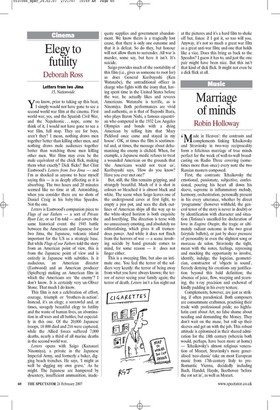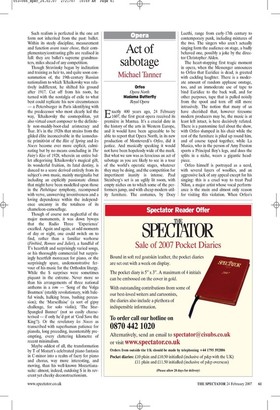Marriage of minds
Robin Holloway Made in Heaven': the contrasts and complements linking Tchaikovsky and Stravinsky in two-way reciprocality form a felicitous marriage of true minds perfect for the week of wall-to-wall broadcasting on Radio Three covering (sometimes more than once) every note the two Russian masters composed.
First, the contrasts: Tchaikovsky the emotional, passionate, subjective, confessional, pouring his heart all down his sleeve, supreme in inflammatory melody, harmony, orchestration, personally present in his every utterance, whether by direct 'programme' (however withheld, the general tenor of the story is never in doubt) or by identification with character and situation (Tatiana's uncalled-for declaration of love in Eugene Onegin; the tragic or ultimately radiant outcome in the two great fairytale ballets), or just by sheer pressure of personality in even the slightest song or morceau de salon. Stravinsky the tight, mean with the notes, feelings, repressing and mocking the opportunity to involve, identify, indulge; the logician, geometrician, constructor of 'objects in sound', fiercely denying his creations any justification beyond this bald definition; the absence of juice, flow, weeping and yearning; the x-ray precision and eschewal of kindly padding in his every texture.
Complements, however, are just as striking, if often paradoxical. Both composers are consummate craftsmen, practising their trade with professional pride; no highfalutin cant about Art, no false shame about needing and demanding the Money. They don't wait on the muse, but roll up their sleeves and get on with the job. This robust attitude is epitomised in their shared admiration for the 18th century (wherein both would, perhaps, have been more at home) — Tchaikovsky's almost religious veneration of Mozart, Stravinsky's more generalised 'neo-classic' take on most European music from 17th-century Italy to preRomantic Vienna, decidedly including Bach, Handel, Haydn, Beethoven 'before the rot set in', as well as Mozart.
Such realism is perfected in the one art form not inherited from the past: ballet. Within its steely discipline, measurement and function avant toute chose, their complementary/contrasting gifts are realised in full: they are ballet's supreme grandmasters, miles ahead of any competition.
Though Stravinsky began by inclination and training as heir to, and quite soon consummation of, the 19th-century Russian nationalism to which Tchaikovsky was relatively indifferent, he shifted his ground after 1917. Cut off from his roots, he turned with the nostalgia of exile to what best could replicate his new circumstances — a Petersburger in Paris identifying with the predecessor who most clearly led the way, Tchaikovsky the cosmopolitan, yet also virtual court composer to the definitely non-muddy-boot-clad aristocracy and Tsar. It's in the 1920s that strains from the gilded elite inconceivable in the iconoclastic primitivist of the Rite of Spring and les Noces become ever more explicit, culminating but by no means concluding in The Fany's Kiss of 1928, wherein an entire ballet allegorising Tchaikovsky's magical gift, its wonderful fruition, its fatal destiny, is danced to a score derived entirely from its subject's own music, mainly marginalia but including an explicitly passionate climax that might have been modelled upon those in the Pathetique symphony, recomposed with verve, unswerving inventiveness and a loving dependence within the independence uncanny in the totalness of its chameleon-camouflage.
Though of course not neglectful of the major monuments, it was down byways that the Radio Three 'Experience' excelled. Again and again, at odd moments of day or night, one could switch on to find, rather than a familiar warhorse (Firebird, Romeo and Juliet), a handful of T's heartfelt and surprisingly varied songs, or his thoroughly commercial but surprisingly heartfelt morceaux for piano, or the surprisingly spare, undemonstrative fervour of his music for the Orthodox liturgy. While the S surprises were sometimes piquant in the extreme. Never more so than his arrangements of three national anthems in a row — 'Song of the Volga Boatmen' (starkly revolutionary, with baleful winds, hulking brass, bashing percussion); the `Marseillaise' (a sort of gipsy challenge, for solo violin); 'The StarSpangled Banner' (not so easily characterised — if only he'd got at 'God Save the King'!). Or the revelatory les Noces as transcribed with superhuman patience for pianola, long preceding, incontestably preempting, every clattering kilometre of recent minimalism.
Maybe oddest of all, the transformation by T of Mozart's celebrated piano fantasia in C-minor into a realm of faery for piano and chorus, way more interesting, and moving, than his well-known Mozartianasuite: almost, indeed, outdoing S in its reverent yet cheeky deconstructionism.























































 Previous page
Previous page